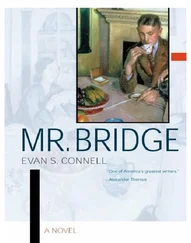“I feel giddy,” said Mrs. Bridge. “I never dreamed of anything like this/’
And when the waiter had taken their order Mr. Bridge proceeded to tell her of the cities they would visit, and as he talked she stopped listening, because she could not help thinking of another evening when he had told her of all he planned to do. He had said he would take her to Europe one day; she remembered having smiled at him fondly, not really believing, not caring, happy enough to be with him anywhere. How long ago, she thought, how very long ago that was! It seemed like eight or ten years ago, but it was more than twenty, and on this day she was forty-eight years old. She grew a little sad at this, and while he talked on and on he was more excited than she she gazed out the window at the gathering clouds. And the distant thunder seemed to be warning her that one day this world she knew and loved would be annihilated.
The clouds descended and the wind began to increase while they were eating. A few drops of rain spattered against the window. It was the season for tornados, and before much longer it had become evident that one was approaching. The club steward turned on the radio and listened to reports of the tornado’s course; it was, he learned, bearing directly toward the country club at a speed of seventy miles an hour. The steward went from table to table explaining the situation and adding that if the storm continued to approach it would be necessary to take shelter in the basement.
“Thank you/’ said Mrs. Bridge. “Do you suppose there’s much chance of it hitting us?”
The steward didn’t know. The tornado was still quite a few miles west; the course of it might alter, or the funnel might degenerate before reaching Kansas City.
“Well, you’ll let us know,” said Mrs. Bridge.
The steward said he would keep them informed.
Soon the trees on the terrace were bending from the wind, and the rain poured down. She saw a metal chair go skidding off the porch as though someone were pulling it away with a rope. A few of the diners had begun to leave the room, and the steward was coming around again.
“Goodness, this is a storm,” said Mrs. Bridge. “Do you think we should go to the basement?”
Mr. Bridge replied that the storm was not going to strike the clubhouse and that he, for one, intended to finish his dinner.
“There goes the mayor/* she said, looking around. The mayor and his wife often ate at the club and the Bridges were acquainted with them.
“Good evening,” said the mayor as he passed by, preceded by his wife.
“Good evening/’ said Mrs. Bridge.
The rain was coming down so heavily it was no longer possible to see through the window. There was no lightning and very little thunder, only the rain and a sense of terrible oppression as though something were lurking nearby.
Mrs. Bridge placed her napkin on the table and said, “Well, it looks like we’re in for it.”
Her husband continued eating.
“Steward, have you any further information?” she asked as soon as he had finished speaking to a couple at the next table.
The steward said the tornado was still approaching and he thought it would be a good idea to go to the basement.
“Thank you,” said Mrs. Bridge, and looked expectantly at her husband.
“I’m going to finish this steak/’ said he.
The steward did not know quite how to proceed; he knew it was his responsibility to get everyone to the basement, and if Mr. and Mrs. Bridge should be swept up and carried away he would be called upon by the club directors for an explanation. On the other hand he did not care to begin giving orders to Mn Bridge who, he knew, was not only short-tempered but very much aware of having been warned. He gazed earnestly at Mr. Bridge, who paid no attention to him, and at last, unable to decide whether he was more afraid of him or of the club directors, the steward hurried off to the radio in hopes that the decision would be taken out of his hands by the course of the storm.
The lights of the dining room looked extraordinarily bright because of the unnatural darkness outside. There was a curious stillness and the rain fell in waves. Mrs. Bridge, looking about, saw that except for her husband and herself everyone had left the dining room.
“Don’t you think we should go?” she asked.
He was chewing and unable to answer at the moment. He swallowed, wiped his lips with his napkin, took a drink of water, and began to butter a piece of cornbread. Finding that he did not have enough butter he began to frown. He liked butter very much and at home he got all he wanted, but whenever they ate out he kept asking for more. Mrs. Bridge, who was on a diet, had already given him the butter from her plate, but this was not enough. Both of them looked around. There was not a waiter in sight.
“Well, I’ll steal some from the next table/’ said Mrs. Bridge. “I don’t suppose anyone will mind.” And she got up and walked over to get a piece of butter for her husband. Fortunately there was an untouched square of it on the table and so she leaned across, holding her beads with one hand so they would not dip into the abandoned dishes, and picked up the butter plate. It was a small china plate with the crest of the country club stamped in gold and she thought as she picked it up how attractive it was. Just then the lights flickered. Apparently the tornado had struck a power line somewhere. Mrs. Bridge turned to go back to the table. She noticed the club steward standing in the doorway. He was watching them. He was wringing his hands and standing on one foot. She smiled politely, feeling a little foolish because of the butter plate in her hand. He smiled briefly and resumed staring at Mr. Bridge.
From the distance came a hooting, coughing sound, like a railroad locomotive in a tunnel; a very weird and frightening sound it was.
“Well, that must be the tornado,” she said, listening attentively, but Mr. Bridge, who was eating the cornbread with great gusto, did not reply. She spread her napkin in her lap again although she had finished eating; she spread it because when she was a child her parents had taught her it was impolite to place her napkin on the table until everyone had finished, and the manners she had been taught she had, in her turn, passed on to her own children.
As the tornado approached the country club Mrs. Bridge remained seated across the table from her husband. She listened to the curious grunting and snuffling of the storm; although she had never been in the path of a tornado before, she knew this must be it, this must be the sound it made the hooting, sucking roar of the vacuum. Now that it was so close it reminded her of a pig rooting on the terrace.
It did not occur to Mrs. Bridge to leave her husband and run to the basement. She had been brought up to believe without question that when a woman married she was married for the rest of her life and was meant to remain with her husband wherever he was, and under all circumstances, unless he directed her otherwise. She wished he would not be so obstinate; she wished he would behave like everyone else, but she was not particularly frightened. For nearly a quarter of a century she had done as he told her, and what he had said would happen had indeed come to pass, and what he had said would not occur had not occurred Why, then, should she not believe him now?
The lights of the country club went out and she thought the breath was being drawn from her lungs. Short streaks of lightning flickered intermittently, illuminating a terrible cloud just outside rushing toward them like a kettle o black water and she caught the unmistakable odor of electricity. In darkness and silence she waited, uncertain whether the munching noise was made by her husband or the storm.
In a little while the lights came on again and the diners, led by the mayor, came up from the basement.
Читать дальше












